 W
WThe Angolan War of Independence, called in Angola the Luta Armada de Libertação Nacional, began as an uprising against forced cultivation of cotton, and it became a multi-faction struggle for the control of Portugal's overseas province of Angola among three nationalist movements and a separatist movement. The war ended when a leftist military coup in Lisbon in April 1974 overthrew Portugal's Estado Novo regime, and the new regime immediately stopped all military action in the African colonies, declaring its intention to grant them independence without delay.
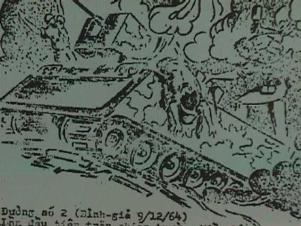 W
WThe Battle of Binh Gia was conducted by the Viet Cong (VC) and People's Army of Vietnam (PAVN) from December 28, 1964, to January 1, 1965, during the Vietnam War in Bình Giã, Phước Tuy Province, South Vietnam.
 W
WThe Communist insurgency in Sarawak occurred in Malaysia from 1962 to 1990, and involved the North Kalimantan Communist Party and the Malaysian Government. It was one of the two Communist insurgencies to challenge the former British colony of Malaysia during the Cold War. As with the earlier Malayan Emergency (1948–1960), the Sarawak Communist insurgents were predominantly ethnic Chinese, who opposed to British rule over Sarawak and later opposed the merger of the state into the newly created Federation of Malaysia. The insurgency was triggered by the 1962 Brunei Revolt, which had been instigated by the left-wing Brunei People's Party in opposition to the proposed formation of Malaysia.
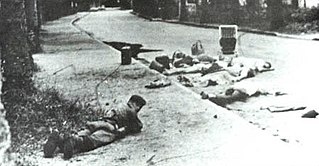 W
WOperation Dragon Rouge was a hostage rescue operation in the Democratic Republic of the Congo conducted by Belgium and the United States in 1964. The operation was led by the Belgian Paracommando Regiment to rescue hostages held by Simba rebels in the town of Stanleyville.
 W
WThe 1964 Gabonese coup d'état was staged between 17 and 18 February 1964 by Gabonese military officers who rose against Gabonese President Léon M'ba. Before the coup, Gabon was seen as one of the most politically stable countries in Africa. The coup resulted from M'ba's dissolution of the Gabonese legislature on 21 January 1964, and during a takeover with few casualties 150 coup plotters arrested M'ba and a number of his government officials. Through Radio Libreville, they asked the people of Gabon to remain calm and assured them that the country's pro-France foreign policy would remain unchanged. A provisional government was formed, and the coup's leaders installed Deputy Jean-Hilaire Aubame, who was M'ba's primary political opponent and had been uninvolved in the coup, as president. Meanwhile, M'ba was sent to Lambaréné, 250 kilometres (155 mi) from Libreville. There was no major uprising or reaction by the Gabonese people when they received word of the coup, which the military interpreted as a sign of approval.
 W
WThe Guinea-Bissau War of Independence was an armed independence conflict that took place in Portuguese Guinea between 1963 and 1974. Fought between Portugal and the African Party for the Independence of Guinea and Cape Verde, an armed independence movement backed by Cuba and the Soviet Union, the war is commonly referred to as "Portugal's Vietnam" due to the large numbers of men and amounts of material expended in a long, mostly guerrilla war and the internal political turmoil it created in Portugal. The war ended when Portugal, after the Carnation Revolution of 1974, granted independence to Guinea-Bissau, followed by Cape Verde a year later.
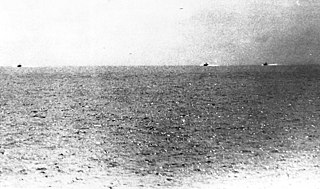 W
WThe Gulf of Tonkin incident, also known as the USS Maddox incident, was a disputed international confrontation that led to the United States engaging more directly in the Vietnam War. It involved both a real confrontation and a fabricated confrontation between ships of North Vietnam and the United States in the waters of the Gulf of Tonkin. The original American report blamed North Vietnam for both incidents.
 W
WThe Israeli–Palestinian conflict is the ongoing struggle between Israelis and Palestinians that began in the mid-20th century amidst the greater Arab–Israeli conflict. Various attempts have been made to resolve the conflict as part of the Israeli–Palestinian peace process.
 W
WIn the Vietnam War, after the assassinations of Ngo Dinh Diem and John F. Kennedy in late 1963 and the Gulf of Tonkin incident in 1964 and the continuing political instability in the South, the United States made a policy commitment to begin joint warfare in South Vietnam, a period of gradual escalation and Americanization, involving the commitment of large-scale combat forces from the United States and allied countries. It was no longer assumed the Republic of Vietnam could create a desirable situation without major external assistance. This phase of the war lasted until the election of Richard Nixon, and the change of U.S. policy to Vietnamization, or giving the main combat role back to the South Vietnamese military.
 W
WThe June 3 resistance movement, also known as 6.3 resistance or the movement against the Korea-Japan negotiations was initiated in June 1964 by the a students and citizens against the Park Chung-hee administration effort to negotiate the normalization of South Korea and Japan diplomatic relations.
 W
WThe Landing at Kesang River was an amphibious raid conducted by a small force of Indonesian volunteers near the Kesang River, on the border between the Malaysian states of Malacca and Johore on the southwestern part of the Malay Peninsula. The landing was part of the broader Indonesia-Malaysia confrontation, an undeclared war fought between Malaysia and Indonesia during the early 1960s over the creation of an independent Malaysian Federation. The conflict chiefly encompassed parts of northern Borneo, areas that Indonesia sought control in her bid to increase her power and influence in Southeast Asia; however, the landing represented a shift of the operational sphere toward the mainland.
 W
WThe Landing at Pontian was an amphibious landing made by a small body of Indonesian troops in the Pontian District of southwestern Malaysia. The landing took place during the Indonesia-Malaysia confrontation, an undeclared war fought between Malaysia and Indonesia during the early 1960s over the creation of a Malaysian Federation encompassing parts of northern Borneo, areas that Indonesia sought to increase her own power in Southeast Asia.
 W
WMartyrs' Day is a Panamanian day of national mourning which commemorates the January 9, 1964 anti-American riots over sovereignty of the Panama Canal Zone. The riot started after a Panamanian flag was torn and Panamanian students were killed during a conflict with Canal Zone Police officers and Canal Zone residents. It is also known as the Flag Incident or Flag Protests.
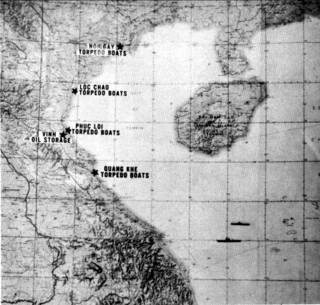 W
WOperation Pierce Arrow was a U.S. bombing campaign at the beginning of the Vietnam War.
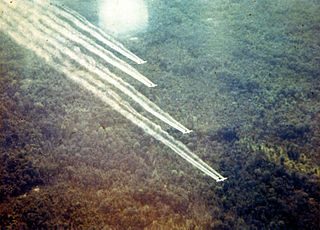 W
WOperation Ranch Hand was a U.S. military operation during the Vietnam War, lasting from 1962 until 1971. Largely inspired by the British use of 2,4,5-T and 2,4-D during the Malayan Emergency in the 1950s, it was part of the overall chemical warfare program during the war called "Operation Trail Dust". Ranch Hand involved spraying an estimated 20 million U.S. gallons (76,000 m3) of defoliants and herbicides over rural areas of South Vietnam in an attempt to deprive the Viet Cong of food and vegetation cover. Areas of Laos and Cambodia were also sprayed to a lesser extent. Nearly 20,000 sorties were flown between 1961 and 1971.
 W
WThe Simba rebellion of 1963–65, also known as the Orientale Revolt, was a rebellion in the Democratic Republic of the Congo which took place within the wider context of the Congo Crisis and the Cold War. The rebellion, located in the east of the country, was led by the followers of Patrice Lumumba, who had been ousted from power in 1960 by Joseph Kasa-Vubu and Joseph-Désiré Mobutu and subsequently killed in January 1961 in Katanga. The rebellion was contemporaneous with the Kwilu Rebellion led by fellow Lumumbist Pierre Mulele in central Congo.
 W
WThe Sunda Straits Crisis was a two-week confrontation between the United Kingdom and Indonesia over the passage of the Illustrious-class aircraft carrier HMS Victorious through the Sunda Strait, a major waterway separating the Indonesian islands of Java and Sumatra, occurring between August and September 1964. The incident was part of the larger Indonesia-Malaysia confrontation, an armed conflict between Indonesia and Malaysia over the formation of the latter as an independent state.
 W
WThe Tuareg rebellion of 1962–1964, sometimes called the First Tuareg Rebellion or the Alfellaga, was an insurgency by populations of what is now northern Mali begun shortly after the nation achieved independence from France in 1960. This short revolt could only be repressed with the entry into the conflict of Morocco and Algeria in 1963, which handed over the 35 leaders of the counter-rebellion, then imposed a military authority on the Tuareg regions.
 W
WSouth Vietnam was in political chaos during much of the year, as generals competed for power and Buddhists protested against the government. The Viet Cong (VC) communist guerrillas expanded their operations and defeated the South Vietnamese Army of the Republic of Vietnam (ARVN) in many battles. North Vietnam made a definitive judgement in January to assist the VC insurgency with men and material. In November, North Vietnam ordered the People's Army of Vietnam (PAVN) to infiltrate units into South Vietnam and undertake joint military operations with the VC.
 W
WThe Zanzibar Revolution occurred in 1964 and led to the overthrow of the Sultan of Zanzibar and his mainly Arab government by local African revolutionaries. Zanzibar was an ethnically diverse state consisting of a number of islands off the east coast of Tanganyika which had been granted independence by Britain in 1963. In a series of parliamentary elections preceding independence, the Arab minority succeeded in retaining the hold on power it had inherited from Zanzibar's former existence as an overseas territory of Oman. Frustrated by under-representation in Parliament despite winning 54% of the vote in the July 1963 election, the mainly African Afro-Shirazi Party (ASP) allied itself with the left-wing Umma Party, and early in the morning of 12 January 1964 ASP member John Okello mobilised around 600–800 revolutionaries on the main island of Unguja. Having overrun the country's police force and appropriated their weaponry, the insurgents proceeded to Zanzibar Town where they overthrew the Sultan and his government. Reprisals against Arab and South Asian civilians on the island followed; the resulting death toll is disputed, with estimates ranging from several hundred to 20,000. The moderate ASP leader Abeid Karume became the country's new president and head of state, and positions of power were granted to Umma party members.